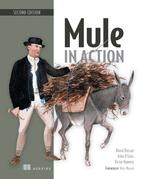Book Description
Summary
Mule in Action, Second Edition is a totally revised guide covering Mule 3 fundamentals and best practices. It starts with a quick ESB overview and then dives into rich examples covering core concepts like sending, receiving, routing, and transforming data.
About the Technology An enterprise service bus is a way to integrate enterprise applications using a bus-like infrastructure. Mule is the leading open source Java ESB. It borrows from the Hohpe/Woolf patterns, is lightweight, can publish REST and SOAP services, integrates well with Spring, is customizable, scales well, and is cloud-ready.
About the Book
Mule in Action, Second Edition is a totally revised guide covering Mule 3 fundamentals and best practices. It starts with a quick ESB overview and then dives into rich examples covering core concepts like sending, receiving, routing, and transforming data. You’ll get a close look at Mule’s standard components and how to roll out custom ones. You’ll also pick up techniques for testing, performance tuning, and BPM orchestration, and explore cloud API integration for SaaS applications.
Written for developers, architects, and IT managers, this book requires familiarity with Java but no previous exposure to Mule or other ESBs.
What’s Inside
Full coverage of Mule 3
Integration with cloud services
Common transports, routers, and transformers
Security, routing, orchestration, and transactions
About the Authors
David Dossot is a software architect and has created numerous modules and transports for Mule. John D’Emic is a principal solutions architect and Victor Romero a solutions architect, both at MuleSoft, Inc.
Table of Contents
- Copyright
- Brief Table of Contents
- Table of Contents
- Foreword
- Preface
- Acknowledgments
- About this Book
- About the Authors
- About the Cover Illustration
- Part 1. Core Mule
- Part 2. Running Mule
- Part 3. Traveling further with Mule
- Chapter 12. Developing with Mule
- Chapter 13. Writing custom cloud connectors and processors
- Chapter 14. Augmenting Mule with orthogonal technologies
- Appendix A. Mule Expression Language
- Appendix B. Component and transformer annotations quick reference
- Appendix C. Mule Enterprise Edition
- Appendix D. A sample Mule application
- Index
- List of Figures
- List of Tables
- List of Listings
